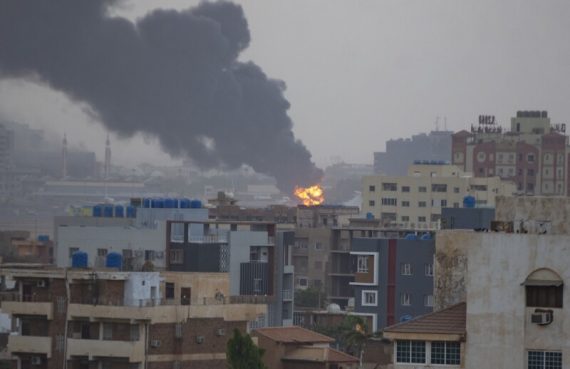I
n 2003, a brief civil war broke out in Sudan between the central government in Khartoum and tribal forces in Darfur underpinned by racism and for control of natural resources. The Sudanese army led by ousted President Omar al-Bashir fought tribal gunmen in the region with the help of the Janjaweed tribal forces, leaving behind some 300,000 dead and more than 2.5 million displaced.
Al-Bashir integrated the Janjaweed forces, led by Mohamed Hamdan Dagalo, also known as Hemedti, which helped his government fight rebels, into the Sudanese Army Intelligence in 2013 giving them the name “Rapid Intervention Forces” (RIF).
Hemedti headed the force and was the right hand of former president al-Bashir. A former camel trader, Hemedti turned against al-Bashir after popular protests broke out against his rule. He joined the head of the Sudanese army Abdel Fattah al-Burhan and ousted al-Bashir.
The Rapid Intervention Forces, comprised of some 100,000 fighters, have light weapons and vehicles. In recent years, Hemedti came to the fore after talks between the Sudanese army and the RIF, on one hand, and Sudanese political parties and civil society, on the other, failed to form a civilian government.
The RIF controls most of Sudan’s gold mining industry, which is involved in trade with countries such as the United Arab Emirates. It has also been accused of committing a massacre against protesters in June 2019, leaving 120 dead.
Hemedti has served as the vice head of the Sudanese Sovereign Council, which was headed by al-Burhan. He has received support from the United Arab Emirates and Ethiopia while al-Burhan has the backing of the U.S. and Egypt.
The RIF has participated in the Arab Coalition forces in Yemen led by Saudi Arabia and the UAE.
Infighting took place in Sudan between the RIF and the Sudanese army after the RIF deployed some of its forces around Khartoum on April 15. Clashes spread to the cities of Marawi, Al-Abyad, Omdurman, and Al-Fashir.
Differences over integrating the RIF into the Sudanese army
One of the main differences between al-Burhan and Hemedti is how they view the process of integrating the RIF into the Sudanese army.
The Sudanese army demanded that the Rapid Intervention Forces be affiliated to the Ministry of Finance, given that it controls the movements and deployment of these forces according to its needs.
Hemedti announced his support for the idea of merging his forces into the Sudanese army, but he stated that it should take place according to agreed time frames, suggesting a 10-year period, where al-Burhan suggested that it should take place in two years.
Recommended
The Rapid Intervention Forces also called for giving their officers the same privileges as those of their counterparts in the army, and demanded that the armed forces adhere to the Sudanese constitution that will be approved.
International efforts including by the EU, the African Union, and the Arab League have all failed to halt the fighting between the RIF and the Sudanese army.
The Sudanese Doctors’ Syndicate announced that 97 people have been killed and 365 others have been injured as of April 16.
Sudan has been witnessing difficult living conditions which saw a serious rise in food prices over the past years. So far, military forces and civil society have failed to reach an agreement that would improve the living conditions of the Sudanese.
Today, the RIF, which was founded to support the Sudanese army in Darfur, seems to be at war with it, making the lives of ordinary Sudanese even more challenging. Will the conflict between al-Burhan and Hemedti end as the conflict in Darfur ended? Only time will tell.





